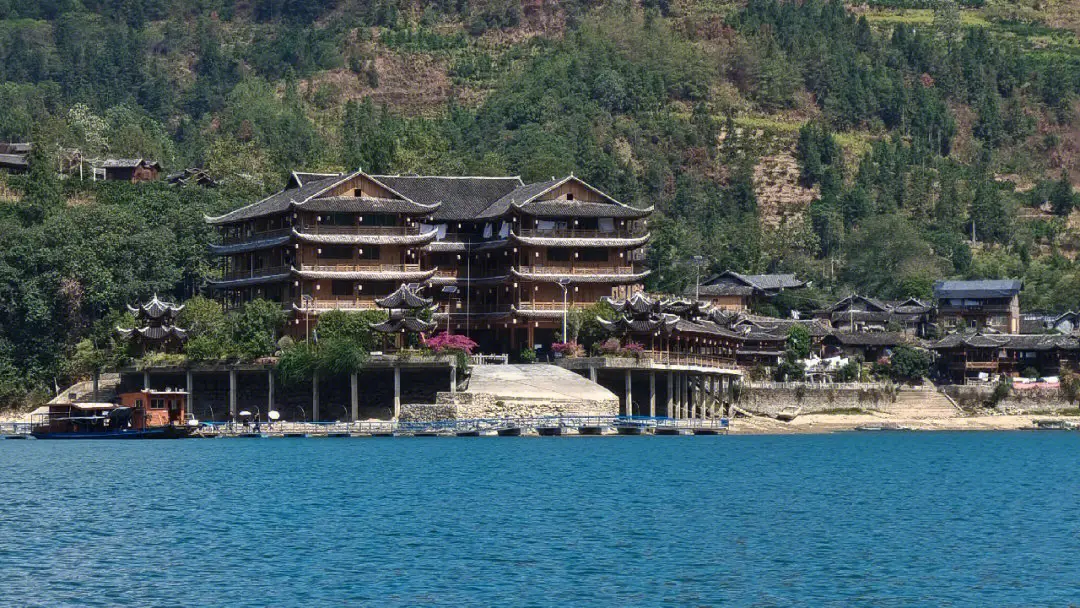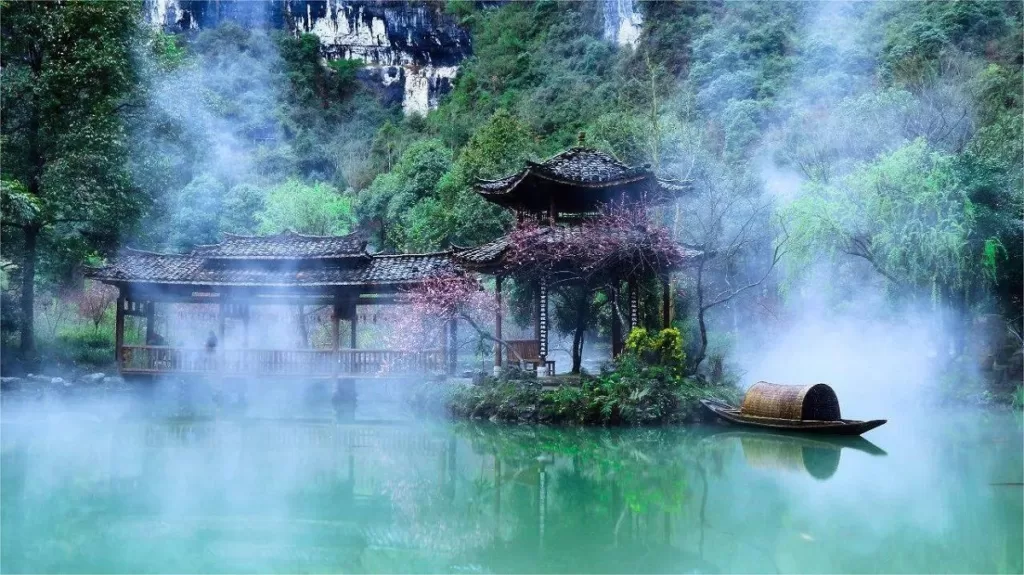Hewan Mountain Village (河湾山寨), located in Youyang County, Chongqing, is renowned as one of the most beautiful Tujia ethnic villages in China. Its name (meaning blends of the river in Chinese) is derived from the winding flow of the mother river of the Tujia people, the You Water River, meandering through its territory. Established in the year 1370 during the Ming Dynasty’s Hongwu era, Hewan Mountain Village spans an area of 15.5 square kilometers and serves as a gathering place for various ethnic minorities, predominantly the Tujia and Miao people, epresenting a distinctive ethnic enclave within Chongqing City.
Perched on the hillsides overlooking the water, the village features a terraced layout with well-defined layers, creating a charming and organized arrangement. Ancient trees stand tall, vibrant green bamboo sways gently, and the architectural style of the village is characterized by traditional Tujia stilted houses with distinctive horse-head corners. Behind the village, layers of terraced fields enhance the natural beauty of the surroundings. The overall topography of the village consists mainly of gentle hills, providing a mild climate with abundant rainfall. The forest coverage reaches an impressive 42%, and the average elevation is 350 meters above sea level.
Table of Contents
- Basic Information
- Location and Transportation
- Highlights of Hewan Mountain Village
- Vlog about Hewan Mountain Village
- Useful Tips Summarized from Reviews
- Other Attractions in Youyang
Basic Information
| Estimated Length of Tour | 1 day |
| Ticket Price | Free |
| Opening Hours | 24 hours a day throughout the year |
Location and Transportation
Hewan Mountain Village is situated at the heart of the You Water River National Wetland Park, flanked to the north by the Three Gorges Mountains and bordered to the south by the charming town of Shidi in Xiushan County. To reach Hewan Mountain Village, you can embark on a journey via train and boat:
- From Chongqing to Houxi Town
- From Chongqing North Train Station, take a high-speed train to Youyang Train Station. The journey costs 112 RMB and takes about 4 hours.
- From Youyang Train Station, proceed to Houxi Town by bus, which takes approximately 2 hours and costs about 15 RMB.
- From Houxizhen Town to Hewan Mountain Village:
- From Houxizhen Town, the only way to reach Hewan Mountain Village is by boat since there are no public buses available.
- The boat ride takes around half an hour to navigate to Hewan Mountain Village.
Highlights of Hewan Mountain Village
You Water River

The You Water River, revered as the mother river of the Tujia people, winds gracefully through the Hewan Mountain Village, creating a breathtaking backdrop that evolves with the seasons. Spring brings a burst of colorful blossoms, summer paints the surroundings in lush greenery, autumn adorns the landscape with crimson maple leaves, and winter blankets the area in glistening snow. The symphony of chirping mountain sparrows and the melodic hum of cicadas further enhance the idyllic atmosphere, making it a truly delightful place to be.
Enchanting Ambiance

Hewan Mountain Village is adorned with rows of ancient and robust maple and poplar trees, complemented by a series of stilted houses that stand in harmonious contrast. The air is filled with the melodious tunes of traditional Tujia woodleaf songs, and the pathways paved with blue stone slabs lead visitors on a journey through history, resonating with the timeless charm of Tujia culture. It is an immersive experience that captivates the senses and encourages visitors to lose themselves in the enchanting ambiance.
Traditions of Tujia People

Hewan Mountain Village is a cultural haven, showcasing the unique and diverse traditions of the Tujia people. The cultural tapestry includes the mesmerizing Tujia hand-waving dance, known as “sheba” or “shebagechi” in the Tujia language, translating to a dance of worship. This ancient ritual dance seamlessly integrates song, dance, music, and drama, depicting scenes from Tujia life, production, and historical conquests. It adds a layer of depth to the village’s cultural identity, leaving an indelible mark on those fortunate enough to witness it.
You Water Boatman’s Shanties

One of the village’s distinctive cultural highlights is the “You Water Boatman’s Shanties,” a unique form of labor songs sung by boatmen along the You Water River. The shanties, encompassing rowing songs, oar songs, towline songs, and unloading songs, are a rich tapestry of over 50 varieties, each with its own distinctive melody and rhythm. These songs, deeply rooted in the region, encapsulate historical legends, segmented narratives of water routes, and depictions of local customs, intertwining and merging seamlessly.
Vlog about Hewan Mountain Village
Useful Tips Summarized from Reviews
Best Season and Activities: The best time to visit is during the summer season when visitors can enjoy swimming in the local water bodies to beat the heat. During other times of the year, popular activities include fishing and sightseeing, allowing visitors to appreciate the natural beauty of the area.
Transportation to the Village: Access to the village typically requires taking a wooden canopy boat (乌篷船). If you’re staying at a farmhouse inn or planning to dine at a local restaurant in the village, the host may offer complimentary boat transportation to and from the village.
Remote Location and Cultural Experience: It’s important to note that the village is somewhat remote and may be considered off the beaten path. While this adds to the charm and allows visitors to immerse themselves in the ethnic minority culture, it’s advisable to plan accordingly, especially if you’re a traveler from out of town. The journey to and from the village may take some time, so it’s best to allocate sufficient time for the visit, especially if you’re on a tight schedule.
Weekend Leisure and Accommodation: Hewan Mountain Village is an ideal destination for weekend leisure trips, offering a serene environment away from the hustle and bustle of urban life. For a more immersive experience, consider staying overnight at one of the farmhouse inns (农家乐) in the village. These accommodations often provide a glimpse into local rural life and hospitality.






There are not many activities to do in the village, suitable for a leisurely exploration and immersion into life. If you are just there for a quick look around and passing through, there’s no need to rush. If it’s on your itinerary and you are not in a hurry, then it’s worth a visit.